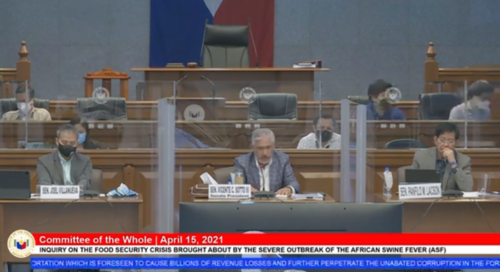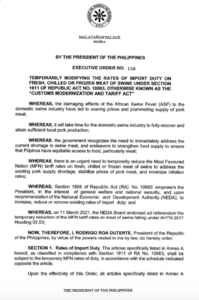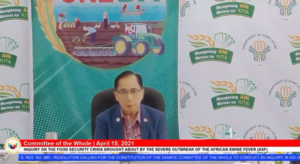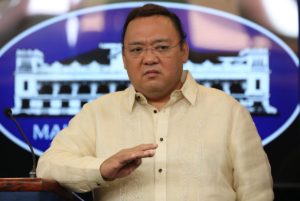Senate, Palace, on collision course over ‘pork’
Sotto links imported pork ‘tongpats’ to 2022 polls

ANOTHER “irritant” has been added in the otherwise ‘cozy relationship’ between the Executive and Legislative branches, this time over the issue of “pork,” literally.
This after the Senate, which again constituted itself as a ‘Committee of the Whole,’ conducted last week two hearings beginning on April 12, 2021, as regards the state of the country’s hog/swine industry still presently being ravaged by the ‘African Swine Fever’ (ASF) and the government’s decision, thru the Department of Agriculture (DA) to lower the import tariff for imported pork while also increasing the allowable import volume, purportedly to address supply shortages.
Two weeks previously, Pinoy Exposé already reported (Issue No. 14) that the Senate and the Palace are already headed for collision over the issue of ‘red-tagging,’ with the chamber now inclined to approve a bill criminalizing it filed by Senate Minority Leader Franklin Drilon.
This, after officials of the National Task Force to End Local Communist Armed Conflict (NTF-ELCAC) accused the officials and members of the Senate union as being the “eyes and ears” of the Communist Party of the Philippines (CPP) inside the chamber.
In a media interview after the Senate’s second hearing last April 15, 2021, on the issues raised by Resolution 685 authored by Sen. Panfilo Lacson, Senate President Vicente Sotto III expressed the chamber’s shock and dismay over the DA’s success in convincing Pres. Duterte to sign Executive Order 128 last April 7, 2021.

The order temporarily reduced the tariff rate for “in quota” importation of frozen pork products from the current 30 percent to 5 percent for the first 3 months and to 10 percent beginning on the fourth month, before reverting back to 30 percent after one year.
For the “out quota,” the rate was decreased from the current 40 percent to 15 percent for the first 3 months and to 20 percent on the fourth month, before again reverting to 40 percent after one year.
The “in” and “out” quotas refer to the country’s “minimum access volume” (MAV) that Pres. Duterte, again thru the machination of the DA, has okayed last March 26, 2021, to be increased from just 54,000 MT (metric tons) MAV to more than 400,000 MT, with an additional 350,000 MT.
Import volume falling within the MAV falls under the “in-quota” category while those outside of it fall under the out-quota category.
The President’s decision is despite repeated warnings from industry stakeholders and both chambers of Congress since last year that doing so would further add to the devastation of the already suffering hog raisers, more than 60 percent of which are composed of “backyard farmers.”
Before filing his resolution, Lacson, last March 16, 2021, had already warned that “corruption” was the main factor behind the machinations of a “syndicate” at the DA that would allow them and their conniving partners in the import industry to earn an extra “tongpats” of P5 to P7 for every kilo of imported pork meat.
Lacson estimated that this would translate to about P6 billion during the one-year period of reduced tariffs and increase volume of imports proposed by the DA and which is now covered by EO 128.
Sotto, in his media interview last April 16, 2021, a day after the Senate concluded its second hearing, reminded that the Executive branch’s power to increase or decrease the country’s import tariff is just a “delegated power” given to it by Congress.
He also said the Palace decision is connected with the national elections next year.
“Somebody wants to earn big bucks here. Is that not obvious,” Sotto said, adding:
“The importers behind this (EO 128), they probably want to earn money quickly… maybe they would need it for the election.”
‘Planned, deliberate move by executive branch’
Sotto also expressed irritation that in the case of EO 128, the DA and other bureaucrats at the executive branch appeared to have agreed to time its approval by Malacañang when Congress is not in session. Congress adjourned last March 26, 2021, the same day Pres. Duterte hiked the country’s MAV.
“This one (EO 128), they (executive branch) have been talking about this as early as January and they were ready by February, it’s like they are ‘dribbling’ us,” Sotto said.

It can be recalled that last March 8, 2021, in the earlier hearing on the ASF and the state of the country’s hog industry and the problem of meat smuggling conducted by the House Committee on Ways and Means chaired by Albay Rep. Joey Salceda, he also expressed disdain over the admission by DA secretary, William Dar, that they would submit for Pres. Duterte’s signature, an executive order reducing the rates of duty for imported pork while also hiking the MAV by March 26, when Congress is already adjourned.
As frozen, imported pork is not allowed to be sold at public wet markets, Salceda at the time noted that the DA is determined not to help the country’s hog raisers but the country’s met processors and supermarket and mall owners, who are the ones allowed to sell such products.
Another clash looming
At the end of the hearing last April 15, 2021, 19 senators signed a resolution urging Malacañang to recall EO 128; in the case of the bill on red-tagging, at least 8 senators had already signified their support, assuring its passage at least at the committee level.

Sotto said that at the end of the day and despite the explanations made by Sec. Dar and his subordinates at the DA, they found no “convincing reason” for the executive branch’s actions.
“Nothing. The only reason that we can see is that the DA and the NEDA (National Economic Development Authority), which sided with the DA; they want to kill the local hog industry,” Sotto said.
He also warned that should Malacañang ignored the Senate resolution urging for the immediate recall of EO 128, they might be compelled to issue another resolution, in conjunction with Congress, also recalling the delegated power that Congress gave to the President to modify the country’s import tariff and tinker with the MAV.
Congress is to resume session on May 17, 2021.
Presidential spokesman, Atty. Harry Roque, in a statement last April 13, 2021, a day after the first Senate hearing, said that while the Palace acknowledged that the power to modify import tariff is indeed a “delegated power” given by Congress to the President, Pres. Duterte also has the power to veto any action taken by Congress.
“Congress may, by law, impose limitations on such delegated power or may reverse the same,” Roque said.
“(But) should Congress pass another bill changing the tariff on imported pork, the President may veto any particular item or items in such appropriation, revenue, or tariff bill,” Roque retorted. ###


